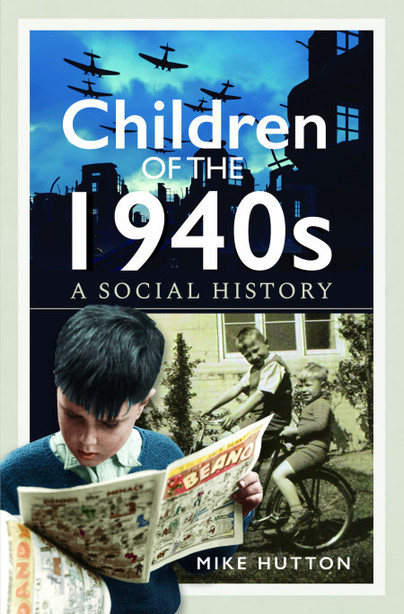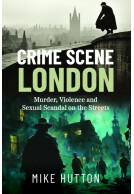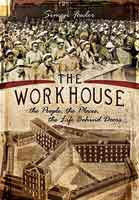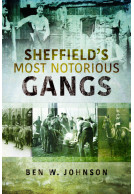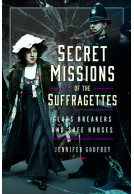Children of the 1940s (ePub)
A Social History
Imprint: Pen & Sword History
File Size: 16.9 MB (.epub)
ISBN: 9781399049528
Published: 13th July 2023
| Other formats available - Buy the Hardback and get the eBook for £1.99! | Price |
|---|---|
| Children of the 1940s Hardback Add to Basket | £22.00 |
What was it really like growing up in the 1940s? There are tales of being dragged from bombed out homes and of watching dog fights in the skies above. Of evacuation and a clash of cultures between city centre kids and their country cousins. All endured strict discipline at school and a shortage of food due to stringent rationing.
Bomb sites provided ready made adventure playgrounds. Pleasures were simple with a weekly pilgrimage to the local cinema for Saturday morning pictures. Sales of comics boomed and Enid Blyton churned out countless books generally loved by the young.
The arrival of the Americans caused a flutter of excitement for children and quite a few of their elder sisters and mums too. Just when it appeared it was all over there was a new threat as buzz bombs brought fear and devastation. Eventually there was a brief moment of celebration with VE Day followed by a massive victory parade.
Austerity continued to gnaw away, not helped by cold winters with frost lining the inside of window frames. Returning fathers were often unwanted strangers whilst some returning were confronted with babies fathered by other men. There was much to be sorted out.
Mike Hutton takes you back to a different world. One where streets offered live theatre populated by knife grinders, rat catchers and the cries of the rag and bone man. The skinny army of the 1940s are old now but their stories live on. Some are desperately sad, all warmly nostalgic whilst others are quite hilarious.
This book is an engaging, easy read. As expected, some of the memories are familiar and match what we see in films and TV, but others are surprising and remind us that children do have a very different view of the world. It was a very interesting decade and considering it as a social history, rather than a military or political history, makes it even more so.
Genealogists' Magazine Volume 34, Number 12, December 2024
5 out of 5
Army Rumour Service (ARRSE)
This is an excellent record of a period of our social history.
Read the Full Review Here
Review as featured in
Who Do You Think You Are
Highlight: 'While acknowledging the hardships, it still manages to be upbeat. Uniquely, this book also shows how the war affected the children as adults - how the experience of these times shaped them.'
I loved this whole book - so many memories came back to me. With the author's dramatic description of the Blitz, I suddenly realised there was something symphonic about the whole thing: 'Above spitfires appeared hunting down invading bombers. There were flashes of searing light whilst incendiaries fluttered down like candy floss.' The stories told are wonderful.
Mitch Murray C.B.E, Leading Composer and Songwriter
Rating: 5 out of 5 stars
NetGalley, Susan Johnston
This is an interesting book that looks at Britain during the 1940s. But what makes it unique is it is from a child’s perspective. It is a first hand account, both by the author and various other first hand sources. It covers all the gruelling deprivations and destruction that were facts of life during the war. Right up until almost the end, for those who lived in the extreme south east and London the terror did not cease.
Yet all of the experiences that made them who they are are witnessed through the filter of childhood. There was the good, the bad and the ugly. It also looks at the post war years of shortages and rations and just dealing with the devastation that surrounded them. The views are both of young people who grew into young adults as well as those whose childhood was still in play. It is truly a fascinating look at historical events through living eyes.
Those children are now elderly, if still alive. I did like the small comparisons between their lives and the lives of those who are young today. The author and the other commentators are quick to say neither is good or bad, right or wrong. It is just different. But I doubt that if today’s young had to deal with the chaos and upheaval that they would not come out quite so well.
Five purrs and two paws up.
Many CALH members, like me, were children of the 1940s. Some of us may have only distant memories of the war years, others are more familiar with the post-war austerity. However, this book raises memories we can all share. Who can forget Uncle Mac of BBC Children’s Hour wishing ‘Good night children-everywhere’, or have found memories of the serials such as Ballet Shoes, or the adventures of Larry the Lamb in Toytown. News that the local newsagent might have sweets for sale lead to hopeful queues everywhere and must remain in most 1940s children’s memories, but other events such as the Austerity Olympics I for one have no recollection at all, so the book shows up the gaps in one’s memory.
Evelyn Lord, Cambridgeshire Association of Local History Bulletin
The book is based on the author’s recollections and the recollections of a number of different people from different walks of life from across the country, plus material from the Mass Observations Survey.
...If you want a nostalgic walk down memory lane or something to show your grand and great children what life was like when you were a child then it is for you.
This isn’t the first book I’ve read about this period, so I was expecting to skim read some of the chapters – but in practice there were so many interesting memories that I read it from cover to cover!
Peter Calver, Lost Couins
For example, I’d never previously realised that when the V1 attacks began in June 1944 it was just one week after D-Day – a population that had thought the end was in sight was suddenly faced with a new deadly menace, one that was unpredictable and hard to counter. Then, just as Britain’s air defences were starting to neutralise a high proportion of the buzz bombs, Germany began launching V2 rockets – bigger, faster, and much more deadly.
The enormous cost of manufacturing Hitler’s V1 and V2 rockets drained the Axis resources at a time when Germany was already under great economic pressure – all for weapons that were of little military value. However, they undoubtedly had an enormous psychological impact on the British civilian population, of southern England especially.
The memories in the book are grouped by topic, including from the war years: life at home, evacuation, school, the Blitz, rationing, Saturday morning pictures, sports and games, comics, the wireless, the arrival of GIs, D-Day and the V1s and V2s with which Hitler responded, and eventual victory. The chapters from the years after the war make sobering reading: the continuation of rationing, austerity, the cold winter of 1947, compulsory National Service and more. You might say that the youngsters of today don’t know how lucky they are!
...whether or not you lived through the 1940s you’ll find this book a fascinating compendium of memories from more than 20 contributors who not only did experience those years, but lived to tell the tale.
Rating: 5 out of 5 stars
NetGalley, Anna Maria Giacomasso
I'm always interested in reading social history book and this one was good and moving as it talks about the life of generation who suffered under bombs and the consequences of a war
Highly recommended.
I loved reading about the experiences of the children during this turbulent time in British history, this made me laugh in places but also feel sadness for a whole generation that grew up in a war.
NetGalley, Kimberly Ricketts
If you want a glimpse into your grandparents'/great-grandparents' lives this is it. I learned so much and enjoyed every moment! Anyone with an interest in the 1940s will love this book. I just wish there were images to go with the great descriptions/stories.
NetGalley, Aubrey Kerr
Rating: 5 out of 5 stars
NetGalley, Marissa Brady
Mike Hutton does a terrific job explaining all the trials, triumphs, technological advances, fashion, Entertainment, and food of the 1940’s that the children of that time experienced. After reading the Chronicles of Narnia Series, I was always curious about what it was like for a child grow up during the Battle of Britain. I was so happy that Hutton did a thorough job explaining the emotional, psychological and social impact that the war had on children of that generation. After reading Hutton’s book, I have to say that the 1940’s are probably the hardest decade ever for a child to have to grow up in. I’m not sure I could have handled half the stuff they did. Overall, the book is rich in details allowing the reader to become immersed in the era almost like you were there living it. I also liked that at the end of the book, the author added some of the famous people who were born during the 1940s. I was surprised by how many of them I knew! The book was amazing, and I would recommend it to anyone to read. I would give this book five out of five stars.
Rating: 5 out of 5 stars
NetGalley, Colin Edwards
The first sentence of Mike Hutton’s Children of the 1940s is the most arresting opening to a non-fiction book I have read for a long, long time. “It was Wendy who suggested we take our clothes off.”
And, just like Hutton, I have moved on to a new paragraph, leaving the thought hanging there. Don’t worry, it was perfectly innocent: Wendy was nine, Mike Hutton and the other three friends were only seven. But what an opening, though! And there are some lovely throwaway lines scattered through the book, such as “True love never dies but it can be impossibly complicated.”
Mike Hutton was born round about 1938 and this book draws upon his and other people’s memories of the 1940s. The short chapters cover many different themes: schooling; food; housing, perhaps with a metal tub in the kitchen used a bath, with each family member taking it in turn; the wide variation in how evacuees were treated, some with kindness and sympathy, some with cruelty and exploitation. There is the inevitable mention of Meccano, dolls and train sets, but also collecting stamps and cigarette cards. The discussion about radio made me smile, with comments about the frequency with which Sandy Macpherson and his ruddy theatre organ popped up on the schedule.
I really enjoyed this book. It covers a time long before I was born, but Hutton has drawn upon the recollections of several people, so we don’t just get a narrow view based upon Mike Hutton’s childhood in a London suburb. And these recollections are not all cosy, either. This is not a selective viewing of history through rose-tinted spectacles, telling us how much better things were in the old days. The book is split in two, with the first half covering the war years and the second half covering the post-war years. That’s a fair split, as WWII ended half-way through the decade, in mid-1945. In several ways, things didn’t get better after the war ended. As Hutton writes, people became disillusioned after the war, as bread was rationed for the first time.
This is no hagiography. Hutton was a child in the 1940s and can thus cast a dispassionate eye upon the adults’ world. Rather than telling us how brilliant Tommy Trinder was in ITMA, Hutton describes the popular radio programmes as “strangely childish and frankly banal” and one senses his bemusement as why the weekly repetition of phrases such as “Can I do you now, sir?” caused the audience to burst into long bouts of uncontrollable laughter. The phenomenon was common to most radio shows of the time and has echoes down to almost the present day with elderly artistes who learned their trade at the time, with Bruce Forsythe’s “Nice to see you; to see you? Nice” and Eric and Ernie’s routine with Eric repeatedly slapping Ernie’s cheek. Why did we laugh at such predictability? Is it a nervous reaction caused by the relief that all is well with the world: we have closure because Mr/Mrs X has uttered their catchphrase and thus normality has usurped the worrying unpredictability of strange times? Is it a residual reaction from our caveman days? Seeing the usual events unfold in their usual context meant there were no savage beasts looking to eat us and so we could relax?
If you want to understand what it was actually like to live in Britain during the 1940s, this is a really good book. It’s not going to tell you about Britain’s foreign policy strategy, or how the raising of the school leaving age to fifteen was part of both a short-term tactical approach to ensuring more jobs for returning servicemen and also a long-term strategy to improve Britain’s human resources. It does, though, tell you how passing or failing the eleven-plus exam could impact one’s life. If I’m researching life in the 1940s, I shall turn to this book before any others.
Rating: 5 out of 5 stars
NetGalley, Miranda Yeung
I guess it is natural to associate with war time when you see this book title "Children of the 1940s". The book composed with 29 chapters in two parts, War Time and and Same Old Austerity. The author Mike Hutton makes the stories alive, not only vividly present in front of the readers, it also likes a time machine bringing you back to one of the darkest time in the history.
This book specifically focuses on the kids before, during and after WW2 in Britain. My parents-in-law are British and they also shared their late 40s and early 50s lives in the Britain. Lives were not easy at that time for sure. I found this book is totally fascinating because the stories of the children were shared in their own experience.
Children of the 1940s is easy to read. It gives you an idea of children lives at that time. Food ration, radio time, city lives and so on. Highly recommend to you all!
Rating: 5 out of 5 stars
NetGalley, Ellen Sullivan
As both a history lover, as well as a teacher of young children, I enjoyed reading this book. It is filled with short glimpses of what daily life was like for children while they were growing up in the 1940's. I really liked how it featured children from a variety of backgrounds and experience. It was also nice that the chapters were short, so that if you only have a few minutes to read, you could still easily read a chapter. I would recommend this book to anyone who is interested in learning more about what life was like for children in the 1940's, as well as anyone who is interested in the history of childhood.
Rating: 5 out of 5 stars
NetGalley, Brenda Carleton
Children of the 1940s by Mike Hutton is every bit as fascinating as I had hoped. The era is one which has fascinated me since I was a kid and I am happy to have learned more. The 1940s of course were horrendous the time before, during and after WWII. At times comical, sobering, haunting and informative, Hutton gives glimpses into the lives of those growing up in 1940s Britain. Also included are photographs which captured my heart.
Children incredibly contended with food rationing, scarlet fever, nits, Morrison shelters, bombs (including the Blitz), losing their fathers and instructed to carry on as they experienced the repercussions of horrific mental and physical injuries of those around them. But children also gathered prized shiny shrapnel, played games, attended school, enjoyed Christmases to a varying degree and marveled at confounding hidden messages following news bulletins on BBC.
After the war helpful household appliances were introduced, suburbia popped up, music and sports changed and expanded, fashion became important once again and the NHS was created.
Many stories are endearing and though I grew up decades after the era filled me with a bit of nostalgia. Descriptions such as bags of crisps with the little blue package of salt are lovely.
Hutton also makes important comparisons between the mentality and expectations then and now.
Rating: 5 out of 5 stars
NetGalley, Zoe Morton
I've absolutely loved reading this book. My parents were born in the early 1940s, and although they were too young to remember most of the war, they certainly remember the world towards the end and afterwards.
My mum was recently diagnosed with dementia and although her short-term memory is virtually non-existent, she does remember lots from the past. This book has really helped spark a lot of memories. I feel like I had a bonus chapter listening to Mum's memories, too.
I loved how this was written and how things were grouped together. Reminders of the past written in an easy to read way. I often read about the war from an adults point of view, but to read from the children's eyes was so fascinating. Because it's not set in one place or one industry, you get to see what was happening across England.
Rating: 5 out of 5 stars
NetGalley, Kathleen RIGGS
Children of the 1940s by Mike Hutton, is a comprehensive introduction into British life in 1940s and the book is told from the perspective of the children during these times. The book covers the entire decade. the primary focus is on the war years themselves.
The stories are told by the children from their memories of these times as the children are evacuated to remote villages, and how many parents got to say a hurriedly goodbye as the British stoic upper lip meant there would be no long farewells.
You are taken on their journeys as the children are split from sisters and brothers and given to people who have a spare room due to the war, they must accommodate these children. They meet their new family's and see that country children are different and there is a clash of cultures between the city kids and their country cousins. You learn how a lot of the city kids have never seen animals due to living in the city, so this is an education as they take refuge in these farming communities.
The children tell how of their experiences after they arrive how their education ais more advanced t in the classroom and, the different games and toys that kept them amused during these times.
There are some incredibly sad tales as there is strict discipline at school and a shortage of food due to stringent rationing. The children in the city tell of being dragged from bombed out homes and witness death and carnage day and night as they are bombed not knowing if they their family's or friends will survive as they find refuge under bomb proof made tables in their homes. They tell of being mesmerised watching dog fights in the skies above. Some of the stories are desperately sad, but nostalgic and some others are quite funny. I thoroughly enjoyed reading this book and the Children of the 1940s is defiantly A part of Social History and readers can certainly learn a lot from reading this book from the children's eyes as they lived through these times.
Rating: 5 out of 5 stars
NetGalley, Meg Gajda
'Children of the 1940's' book illustrates life of children during the IIWW and years after that. The author mentions all aspects of life in that difficult time - the stories said by those who survived.
A reader can learn about evacuation of children to remote villages, how they were fed, their games and toys, education and much more.
This book is well-structured and beautifully written. Highly recommended!
The 1940s was a very long time again ago now, a time of bombsites, air raids, Dinky toys, Meccano and austerity, a far cry from the Nintendo and social media filled worlds of 21st century children today. Older readers (now in their seventies, eighties and nineties) can read Mike Hutton's book and see how well it matches up to their own memories of the decade. For everyone else, Hutton brings the past vividly to life.
NetGalley, Chris Hallam
"Children of the 1940s" by Mike Hutton, is a comprehensive introduction British life in 1940s told from the perspective of the children of the time. The book covers the entire decade but the primary focus is on the war years themselves and the subsequent long transition to peace and prosperity during the Age of Austerity that followed. Throughout the book the focus is on the experience of children at the time as told in their own voices.
NetGalley, Mohan Vemulapalli
This book is recommended for anyone who is interested in British social history of the mid=twentieth century .
Rating: 5 out of 5 stars
NetGalley, Nicola Wilton
What an amazing and vivid account of the life that children of the 1940’s would have experienced.
Right from the start I was so invested in this book and I truly loved reading about the life of the times. It’s so different from how youngsters are brought up today and it made for such an interesting read. It’s bizarre to say that it was ‘history’ as it was just how life was back then and no doubt in another 50 years time, we’ll be looking back into how the childhoods have again changed and moved on.
Comprehensive and totally immersive, each chapter took you down nostalgia lane for those who lived during the 40’s. This was a time of war, post war, rations, changes to society and making do and mend. Each chapter focused on one element, whether that was food, entertainment, school, family dynamics, society and home life.
I found it all so interesting and the accounts of those who shared some of their stories was amazing to read. I always looked forward to going back to this book, to be transported to times of old whilst also learning about the 40’s childhood life. It’s a book I’d go and read again. An effortless enjoyment!
My mother grew up in London during this era so I was raised on stories of the time. This book was such a treat as it gave me the opportunity to explore further all those things I had heard about. It’s well written and carefully documents an interesting time in our history.
NetGalley, Louise Gray
About Mike Hutton
Mike Hutton is a social historian and novelist. His particular emphasis on the first half of the 20th century reflects a period of unprecedented change. His interests include British art and a wide range of sports. He lives with his wife in the heart of rural England.







